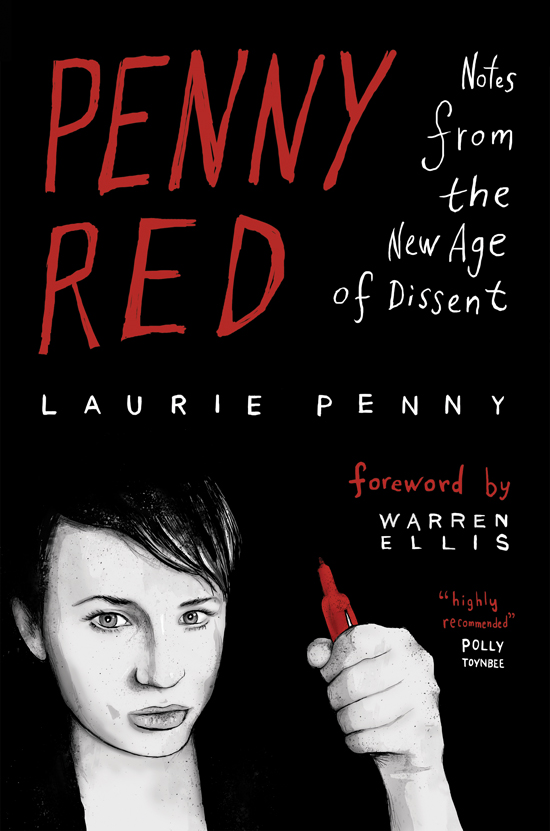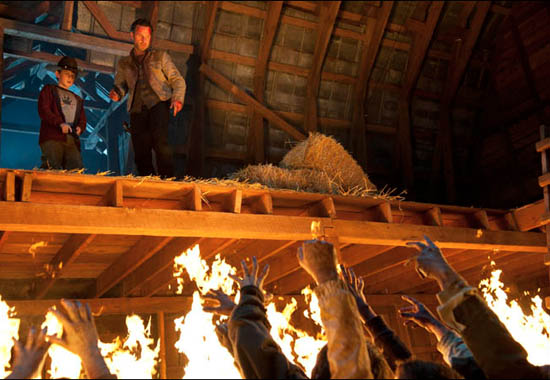
Laurie Penny: In Defence Of Cunt3
Posted In Activism,Blog,Books,Entertainment,Politics,Relationships,Sex,Society
by Blogbot
Born of the internet age, 25-year old flame-haired Laurie Penny aka @PennyRed is front and center of the new guard of left wing activist journalists. Having made substantial waves in the UK with her outspoken opinions on politics, feminism and gender, the London born provocateur is currently putting the cat amongst the pigeons in New York City where she has been reporting on the Occupy movement, among other things. A self-identifying utopian, the revolutionary writer fearlessly makes use of the word socialist. Another word Penny would like to see rehabilitated and restored to the common vernacular is cunt. Here she explains why…

Laurie Penny: In Defence Of Cunt
2 February 2011
It is, according to Germaine Greer, the one word in the English language that retains the power to shock. This week, after the third BBC newsman in two months – this time the revered Jeremy Paxman – dropped the c-bomb on live television, it appears that the world’s best-respected broadcasting operation is in the grip of a collective and extremely specific form of Tourette syndrome, whereby presenters can’t help but slip the worst word of all into casual conversation. One is reminded of those playground horror stories of cursed words, infectious words that, once read or overheard, niggle away in the forefront of your brain until, like poison, you’re forced to spit them out, with deadly consequences. But what – ultimately – is so terribly offensive about the word ‘cunt’?
The word shocks because what it signifies is still considered shocking. Francis Grose’s 1785 A Classical Dictionary of the Vulgar Tongue defines ‘cunt’ quite simply as ‘a nasty name for a nasty thing’. All sorts of people have a problem with ‘cunt’, even those who normally consider themselves progressive and enlightened: last week, for example, I was invited to speak at a public meeting where I happened to use the word in reference to a member of the audience.
Horrified silence fell in this roomful of hardened activists, followed a few seconds later by nervously appreciative laughter. The incident later exploded on the internet, with some complaining that I had had no right to use such a provocative and shocking word at a meeting; that the word is too aggressive, too graphic. These, for context, are people who are currently cheerleading calls for a general strike and/ or the overthrow of the government, but they still consider a young woman saying ‘cunt’ in public a little too, too much.
What is it about that word? Why, in a world of 24-hour porn channels, a world with Rihanna’s ‘Rude Boy’ playing on the radio and junior pole-dancing kits sold in Tesco, is the word ‘cunt’ still so shocking? It’s a perfectly nice little word, a word with 800 years of history; a word used by Chaucer and by Shakespeare. It’s the only word we have to describe the female genitalia that is neither mawkish, nor medical, nor a function of pornography. Semantically, it serves the same function as ‘dick’ or ‘prick’ – a signifier for a sexual organ which can also be used as a descriptor or insult, a word that is not passive, but active, even aggressive.
There are no other truly empowering words for the female genitalia. ‘Pussy’ is nastily diminutive, as if every woman had a tame and purring pet between her legs, while the medical descriptor ‘vagina’ refers only to a part of the organ, as if women’s sexuality were nothing more than a wet hole, or ‘sheath’ in the Latin. Cunt, meanwhile, is a word for the whole thing, a wholesome word, an earthy, dank and lusty word with the merest hint of horny threat. Cunt. It’s fantastically difficult to pronounce without baring the teeth.
It is this kind of female sexuality – active, adult female sexuality – that still has the power to horrify even the most forward-thinking logophile. Despite occasional attempts by feminists such as Eve Ensler to ‘reclaim’ the word cunt as the powerful, vital, visceral sexual signifier that it is, the taboo seems only to have become stronger. Media officials avoid it with the superstitious revulsion once reserved for evil-eye words, as if even pronouncing ‘cunt’ might somehow conjure one into existence. The BBC wouldn’t be in half so much trouble if James Naughtie had called Jeremy Hunt MP a ‘prick’ or a ‘wanker’ or a ‘cold-blooded Tory fucker’.
For me, ‘cunt’ is, and will always be, a word of power, whether it denotes my own genitals or any obstreperous comrades in the vicinity. The first time I ever used it, I was 12 years old, and being hounded by a group of sixth-form boys who just loved to corner me on the stairs and make hilarious sexy comments. One day, one of them decided it would be funny to pick me up by the waist and shake me. I spat out the words ‘put me down, you utter cunt’, and the boy was so shocked that he dropped me instantly.
Ever since then, ‘cunt’ has been a cherished part of my lexical armour. I use it liberally: in conversation, in the bedroom, and in debates. I only wish I could hear more women saying it, more of us reclaiming ‘cunt’ as a word of sexual potency and common discourse rather than a dirty, forbidden word. If the BBC continues its oily pattern of vulgar logorrhoea, I’d like to hear Julia Bradbury saying it on Countryfile. I’d like to hear Kirsty Young saying it on Desert Island Discs.
Men have so many words that they can use to hint at their own sexual power, but we have just the one, and it’s still the worst word you can say on the telly. Let’s all get over ourselves about ‘cunt’. Let’s use it and love it.
Laurie Penny is a journalist, feminist, and political activist from London. She is a regular writer for the New Statesman and the Guardian, and has also contributed to the Independent, Red Pepper, and the Evening Standard. She is the author of Meat Market: Female Flesh Under Capitalism (2011). She has presented Channel 4’s Dispatches and been on the panel of the BBC’s Any Questions. Her blog, “Penny Red“, was shortlisted for the Orwell prize in 2010.
In Defence Of Cunt is excerpted from the book Penny Red: Notes from the New Age of Dissent, and is reprinted with the kind permission of Pluto Press.








